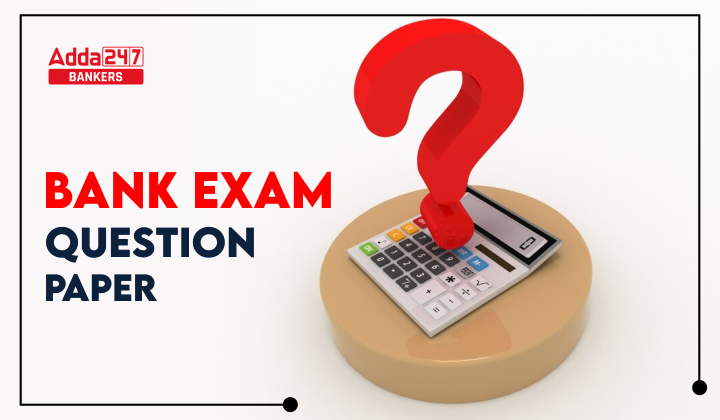Preparing for bank exams requires more than just studying theory. To crack exams like IBPS, SBI, RBI, NABARD and LIC, candidates must practice regularly and understand the real exam pattern. One of the most effective tools for smart preparation is Bank Exam Previous Year Question Papers (PYPs). Previous year question papers helps the candidates to understand the type of questions asked, the difficulty level and the important topics. By solving these papers, aspirants can improve their speed, accuracy, and confidence, which are essential to clear competitive banking exams. In this article, you will find the importance, benefits, and direct download information for Bank Exam Previous Year Question Papers PDF.
Bank Exam Previous Year Question Papers
Bank Previous years’ question papers serve as invaluable resources for exam preparation. They provide insight into the format, structure, and types of questions that may appear in upcoming exams. By reviewing past papers, students can familiarize themselves with the exam pattern, identify recurring topics or concepts, and gauge the level of difficulty expected.
| Bank Previous Years Question Papers | |
| Exam | Previous Year Question Paper |
| IBPS Clerk |
Click here to Download |
| IBPS PO |
Click here to Download |
| IBPS SO | Click here to Download |
| SBI Clerk | Click here to Download |
| SBI CBO | Click here to Download |
| SBI PO | Click here to Download |
| IBPS RRB |
Click here to Download |
| RBI Assistant | Click here to Download |
| RBI Grade B |
Click here to Download |
| LIC AAO | Click here to Download |
| LIC ADO | Click here to Download |
| NABARD Grade A |
|
Bank Exam Question Paper
Bank Exams are not just assessments of knowledge but are opportunities to showcase your abilities understanding, critical thinking and problem-solving skills. Bank exams serve as a medium through which banks acquire young talented professionals. In this post, we shall evaluate the art of navigating exam question papers with fineness and some of the previous years’ question papers
- Understanding the Structure: The first step in conquering bank exam question papers is understanding their structure. Most question papers are divided into sections or categories, each focusing on specific topics or subjects. Familiarize yourself with the format of the paper, including the number of questions, allocation of marks, and any instructions provided.
- Prioritizing Time Management: Time is a precious commodity during exams, and effective time management is crucial for success. Allocate an appropriate amount of time to each section based on the marks assigned and the complexity of the questions. Start with the sections you feel most confident about to build momentum and allocate sufficient time for revising and reviewing your answers towards the end.
- Analyzing Questions: Once you’ve familiarized yourself with the structure and instructions, analyze the questions systematically. Read each question attentively, identifying key concepts, keywords, and requirements. Break down complex questions into manageable parts, ensuring a comprehensive understanding of what is being asked before formulating your response.
- Applying Strategic Approaches: Different types of questions may require different strategic approaches. For objective questions such as multiple choice or true/false, eliminate incorrect options before making your selection. For subjective questions, such as essays or case studies, organize your thoughts coherently, provide relevant examples or evidence to support your arguments, and adhere to any specified structure or format.
- Understand the Instructions: Before diving into the questions, carefully read and decipher the instructions provided. Pay close attention to any specific guidelines regarding formatting, word limits, or calculation methods. Misinterpreting instructions can lead to unnecessary errors and deductions, so ensure clarity before proceeding.
- Reviewing and Revising: Once you’ve completed all the questions, resist the temptation to submit your paper immediately. Use any remaining time to review your answers systematically. Check for errors in calculation, clarity of expression, and coherence of arguments. Make any necessary revisions or additions to strengthen your responses and ensure accuracy.
Benefits of Solving Bank Exam Previous Year Question Papers
There are numerous benefits of solving Bank Exam Previous Year Question Papers. It is an invaluable practice for exam preparation, offering candidates a structured approach to revision, improving time management skills and maximising their chance of selection.
- Understand exam patterns and time management
- Effectively revise and practice key concepts
- Recognize question trends and priorities study areas or subjects
- Identification of strengths and weaknesses for targeted preparation
- Simulate to exam conditions and reduce anxiety
| Related Posts | |
| IBPS PO Cut Off | SBI Clerk Salary |
| IBPS PO Syllabus | SBI Clerk Syllabus |
| IBPS PO Salary | SBI Clerk Cut Off |
| SBI PO Salary | SBI PO Syllabus |




 NABARD Grade A Previous Year Question Pa...
NABARD Grade A Previous Year Question Pa...
 NABARD Development Assistant Previous Ye...
NABARD Development Assistant Previous Ye...
 IDBI Junior Assistant Manager Previous Y...
IDBI Junior Assistant Manager Previous Y...









